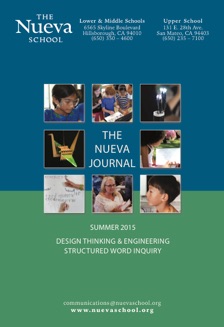
SWI at The Nueva School
SWI at The Nueva School
How did SWI at Nueva start?
In 2009, Matt Berman, an elementary teacher at the Nueva School attended my 3-day Summer Course in Wolfe Island via Skype. He created the Real Spellers website that is so important to our community within a couple of months. As Matt recalls in the article below on moving from spelling to critical thinking, he emailed me with this comment,
“After 31 years in the classroom, it takes something radically new (to me) to set me on fire, and if it’s something that tells me what I’ve been doing for 31 years has been all wrong and I have to start all over from scratch, so much the better.” Matt Berman
Matt started things in his own classroom and then in 2011 made my first trip to Nueva as I was invited to speak at the Innovative Learning Conference (ILC) they host every other year. In 2013, I spoke at the next ILC, but this time I stayed for a week to work with teachers and students in and out of classrooms and a two day workshop on the following weekend. That was the year things started to really change. Emily Kolatch, the head Lower School had a remarkably quick understanding of the implications of what I was sharing. She made it clear on that visit that she was going to do whatever she could to make SWI drive instruction at Nueva.
While Nueva was getting interested in SWI, I was extremely optimistic about the fertile ground Nueva was offering SWI. The culture of learning here was special. Design Thinking was something that embedded inquiry in the culture from the start in a powerful way. With time I came to understand what I think is a powerful relationship between SWI and Design thinking. SWI is scientific inquiry of the trails of meaning traced by the oral and written word. Design thinking is about using a scientific approach to creating new solutions to resolve perceived problems. Both are based on scientific inquiry, but in different directions.
Structured word inquiry is about using scientific inquiry to uncover a path that already exists. Design thinking is about using scientific inquiry to build a path that does not yet exist.
I’m convinced that these dual experiences of inquiry feed each other well.
With growing understanding and success with teachers and students, the desire for more learning by teachers grew. (Nothing motivates learning like understanding!)
Eventually, my friend and colleague, Gail Venable was invited to take a half time position as a kind of “Real Spelling Coach” for the teachers. Now the learning really took off. And when Gail announced her retirement to focus on grandma duties, I was offered the full time “scholar in residence” position for a year to build on the learning that had taken place.
In the meantime, with each visit and public workshop the wider community of educators has grown like no other location. It is an exciting time for instruction of the written word in the Bay Area.
I encourage you to explore the excellent articles to learn more about SWI and the Nueva School.
The 2015 Summer Nueva Journal: Articles on SWI at Nueva

Coming Home: Structured Word Inquiry (Click HERE)
(An excellent short overview of the educational philosophy that underlies SWI by the head Lower School, Emily Kolatch)
Investigating Calendar Roots (Click HERE)
(An account of the learning that grew from a Grade 1 class investigating the etymology and spelling of the days of the week.)
Structured Word Inquiry: Moving from Spelling to Critical Thinking (Click HERE)
(An account of the arrival and integration of SWI into the everyday learning/instruction at Nueva.)
Spreading the Word: The Structured Word Inquiry Institute (Click HERE)
(An account of the annual SWI Summer Institutes at Nueva.)
SWI in First Grade -- Hypothesizing <cardiovascular> (Click HERE)
(An account of an amazing Grade 1 SWI Investigation.)